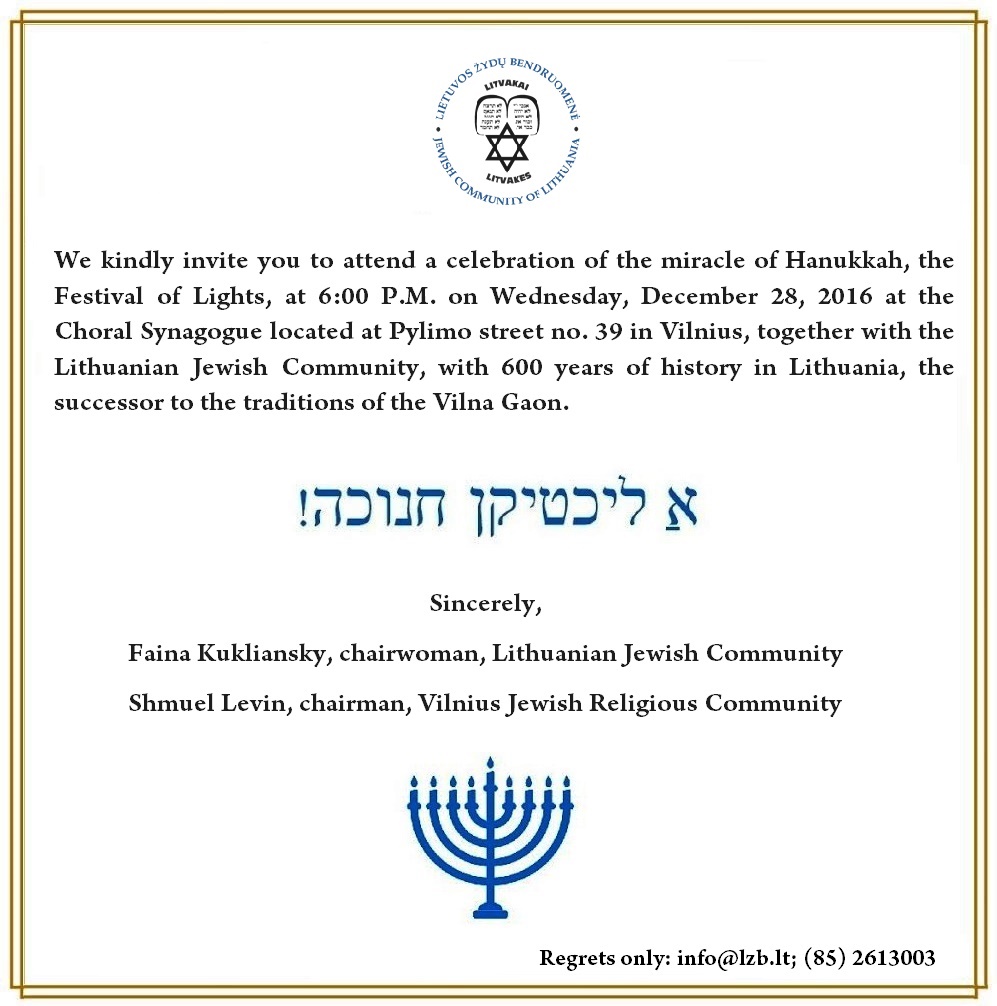 Program:
Program:
Klezmer music
Story of Hanukkah by Rabbi Kalev Krelin
Candle-lighting ceremony
Holiday statements and wishes
Traditional Hanukkah treats
 Program:
Program:
Klezmer music
Story of Hanukkah by Rabbi Kalev Krelin
Candle-lighting ceremony
Holiday statements and wishes
Traditional Hanukkah treats
Celebrating their 45th birthday, the Jewish song and dance group Fayerlakh is inviting everyone to a concert at the Vilnius Polish House of Culture (Naugarduko street no. 76, Vilnius) at 5:00 P.M. on Sunday, December 18. The concert will feature Jewish dance, Yiddish songs and a group of klezmer musicians.
The ensemble is constituted of over 40 members and the youngest Fayerlakh member is just 5 years old. The oldest is now almost 70. Although times change, Fayerlakh stands as an unextinguished flame, formed way back in 1971.
Tickets just 8 euros for Jewish Community members!
Get your tickets by internet here: http://www.tiketa.lt/jubiliejinis_koncertas_fajerlech__45_75662
The Goodwill Foundation has received notice from bailiff/collector Dalius Traigys dated December 6, 2016, indicating public enterprise Menachemo Namai [House of Menachem] school (corporation code 302851682) has debt of €99,916.73 to the Vilnius city department of the State Social Insurance Fund, and calling upon the Goodwill Foundation to deposit any payments allocated for Menachemo Namai in Dalius Traigys’s account.
The Goodwill Foundation has known about the possible financial difficulties of Menachemo Namai and acted carefully and far-sightedly in having decided earlier not to allocated partial financing to Menachemo Namai projects submitted to the Goodwill Foundation. If it had been otherwise, Goodwill Foundation funds intended for projects for which the Menachemo Namai school had sought funding would have been used to the school’s creditors instead.
Attorneys Linas Makaveckas and Valentas Gailius
info@gvf.lt
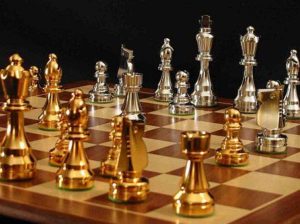
As we near the eight days of Hanukkah, the Lithuanian Jewish Community and the Rositsan and Maccabi Elite Chess and Checkers Club invite you to a chess tournament to be held at the LJC, Pylimo street no. 4, Vilnius, at 5:00 P.M. on Sunday, December 18.
Tournament director: FIDE master Boris Rositsan
For more information, please contact:
info@metbor.lt
+3706 5543556
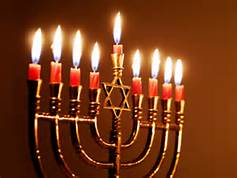
for lzb.lt by Dr. Aušra Pažėraitė, associate professor and lecturer, Religious Studies and Research Center, Vilnius University
“…While the Chabad Hassidim cannot be excluded from the ranks of Lithuanian Jews (their communities in Vilnius go back to the time of the Russian Empire), they do not represent all Lithuanian Jews, and especially not those who consider themselves misnagdim, largely known simply as Litvaks. Perhaps the Vilnius municipality this year could seek for some sort of Solomonic solution which wouldn’t step on the toes of the Litvak community and would take their traditions into account. Or simply point out that the erection of a giant menorah is not tacitly understood as a universal Jewish tradition…”
The holiday of Hanukkah, celebrated for 8 days beginning on Kislev 25, is one of those holidays which the Torah does not demand be celebrated. That’s understandable, since the holiday comes from a time after the Torah was given. The name of the holiday is explained by examining the root, which indicates inauguration, celebration, dedication, establishment, and these actions are connected with the reconsecration of the Temple in Jerusalem. The holiday is begun by lighting a candle or an oil lamp, over the eight days lighting one more flame each day. The Talmud (Shabbat 21b-22a) relates that one school of thought in the first century, Beit Shammai, was of the opinion all eight flames should be lit initially and successively extinguished one by one daily, while Beit Hillel followers believed one flame should be lit the first day, two the second day until all eight were lit, which is the belief which took hold and is followed till today. As Rabba bar bar Hana explains, relying upon what Rabba Johanan said on the issue: “The thinking of Beit Hillel is that we should grow in the light, not shrink” (Shabbat 22a). Light should increase daily. It is the opinion of many authors that something which burns up by itself in a limited time should be burned, and that there be just enough “fuel reserves” that it extinguish itself within 30 minutes after “the onset of night.” Therefore electric light bulbs are inappropriate. Although some allow their use, if there is nothing else available, no special blessing is said upon their lighting.
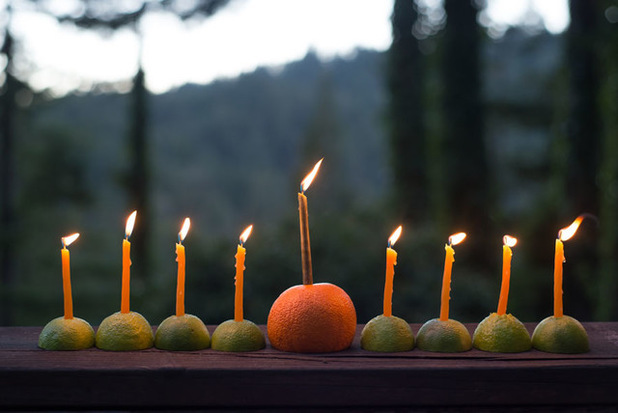
by Geoff Vasil
There’s a bit of mystery as to what Hanukkah is among non-Jews. I grew up in America and went to an “alternative” grade school in the 1970s, where they attempted to teach us about different cultures. One winter, when I was in the first grade, some nice ladies came and told us the Hanukkah story. I think even then they stressed it was NOT the Jewish Christmas, and they told us the traditional gift for children was a simple orange, which were scarce in Northern Europe and reminded Jews of their true homeland.
That’s the good news about Hanukkah, if you’re worried about what gifts to buy. Hanukkah isn’t a big gift-giving holiday. Children may expect an orange or Hanukkah gelt, foil-wrapped chocolate coins. It’s traditional for children to spin the dreidl on Hanukkah, and foods fried in oil—doughnuts and potato pancakes or latkes—are traditional, for reasons to be explained below.
Of course in Western society, in majority-Christian cultures, Hanukkah must compete in the mind of the child with that grand finale of all holidays, Christmas. Christmas is so pervasive it has been adopted even by the non-Christian Japanese. In the Soviet Union they could never quite get rid of it, despite determined efforts to create a universal Winter Holiday with all sorts of fairytale and cartoon characters (including Disney characters towards the end-times for the USSR). Romanian dictator Nicolae Ceaușescu only really met his fate after he outlawed Christmas. Santa Claus seems to have some very powerful friends, and as the saying goes, you can’t fight city hall, in this case, you can’t fight the pull of the North Pole and Santa’s workshop. Of course Jews aren’t fighting, or joining, just maintaining what is called the minor holiday of Hanukkah in parallel with the Christian festival.
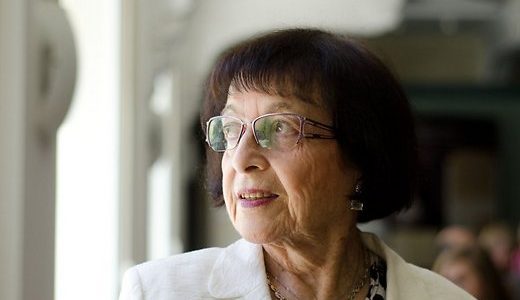
Cultural historian Aurimas Švedas’s book “Irena Veisaitė. Gyvenimas turėtų būti skaidrus” [Irena Veisaitė. Life Should Be Transparent] will be launched at the Vilnius Picture Gallery at 6:00 P.M. on December 15. Historian Saulius Sužiedėlis says the book contains unforgettable images of 20th century Lithuanian history, including the Jewish and Lithuanian interwar period in Kaunas, the ruthless reality of the war and the Holocaust, rescue and rebirth.
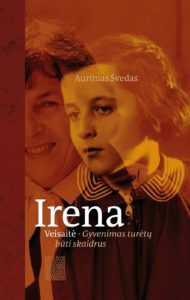
Author Švedas, the subject of the book Irena Veisaitė herself, theater producer Audra Žukaitytė, director Gintaras Varnas and literary scholar Kęstutis Nastopka are to attend the book launch, to be moderated by Vytenė Muschick. The book details the extraordinary life of the German literature specialist, drama expert and long-time director of Lithuania’s Open Society Fund.
Poet, translator and student of culture Tomas Venclova said of the book: “This book belonging in the genre of long conversational is a prerequisite for everyone who is interested in Lithuanian history over recent decades. Irena Veisaitė is one of the most enlightened people of our land, the incarnation of tolerance and common sense. She devotes the most attention to culture, especially the theater, and the cultural opposition in the Soviet period, but very wisely, avoiding extremism and empty words, also lays out painful philosophical questions.”
Full story in Lithuanian here.
Word has reached the Lithuanian Jewish Community Dov Levin passed away December 3. Levin was born in Kaunas January 27, 1925. He joined the partisans and left Lithuania on foot for Jerusalem on January 17, 1945. He is the author of numerous groundbreaking works about the Holocaust in Lithuania and about Litvak culture. Our deepest condolences to his family and loved ones on the death of a man who meant so much to so many.
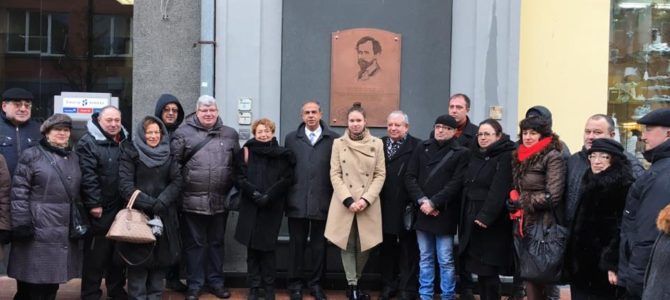
A plaque commemorating Litvak coin and medal designer Victor David Brenner (1871-1924) was unveiled in his hometown Šiauliai (Shavl) December 14. Lithuanian Jewish Community chairwoman Faina Kukliansky, Israeli ambassador Amir Maimon, Šiauliai mayor Artūras Visockas, Šiauliai Jewish Community chairman Josifas Buršteinas and Community members took part in the ceremony to unveil the plaque on the outside wall of the Šiauliai Bank building at Tilžės street no. 149. Brenner designed the Lincoln-head United States one cent piece still in circulation over 100 years ago.
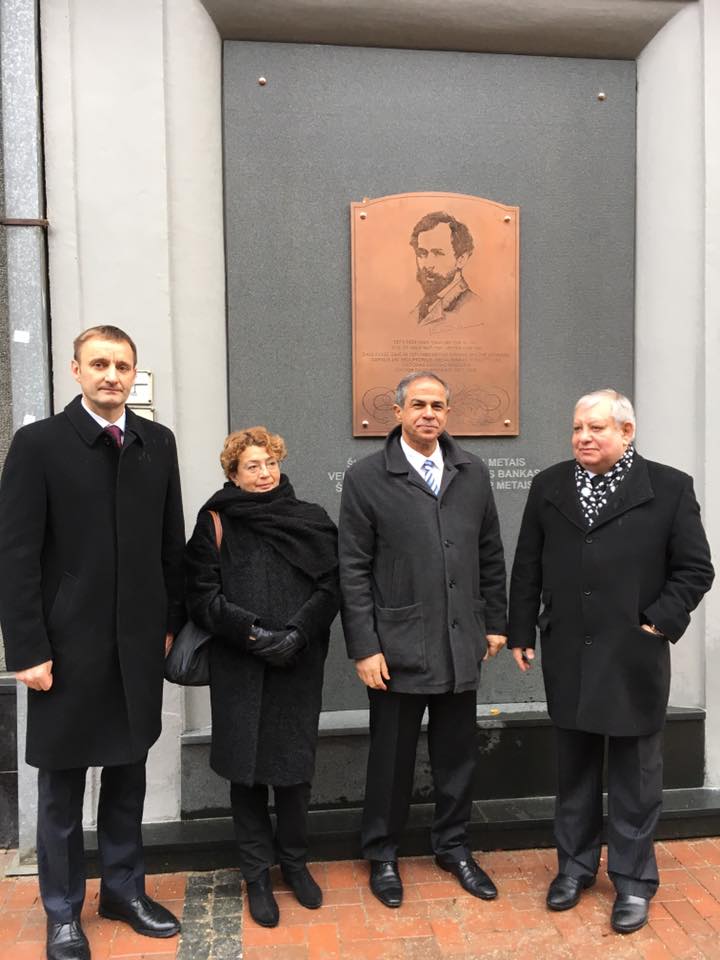
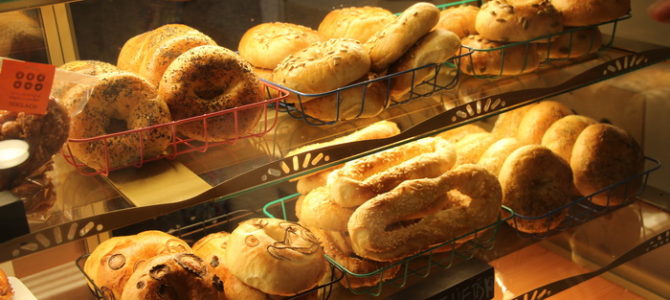
Travel journalist and photographer Evgenii Golomolzin from St. Petersburg, Russia, has written a long piece about the culinary experiences available in Vilnius, with the Bagel Shop featured prominently.
Vilnius is a cosmopolitan city where all sorts of ethnic dishes are on offer, he writes. As a heavily Jewish city of many centuries, it has preserved Jewish traditions even after the Holocaust. There is an old Jewish quarter. A year ago the Bagel Shop Café appeared as well. The kosher café the Bagel Shop is an exotic attraction. The Bagel Shop is located at Pylimo street no. 4. The café is not large and is very simple, but original. It feels like a small apartment with the books and knickknacks on the shelves. You can read the books as you sip coffee, you can buy a Hebrew dictionary or a Jewish calendar. But people come here not for the books, but for the real Jewish treats and the bagels (€0.85 apiece). Five kinds are sold at the café.
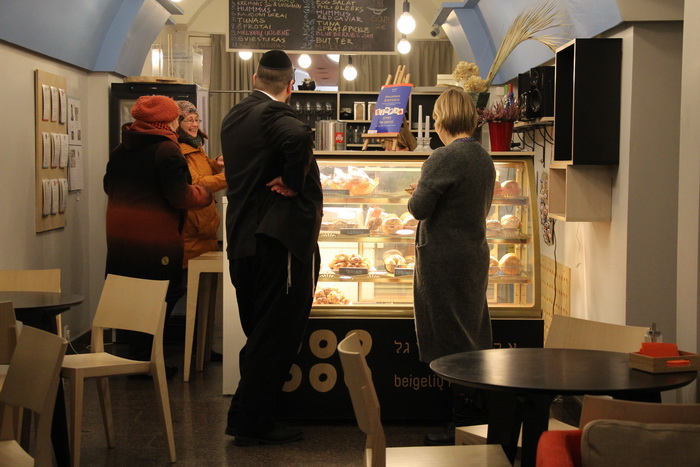
The display case also has lekakh, a Jewish sweet-cake; imberlakh, a pastry made of carrots, ginger and orange; and teiglakh, small cakes cooked in honey. You can order something more filling, for example, soup with dumplings (€2.00), an egg-salad sandwich (€3.60), tuna sandwich (€3.60) or hummus sandwich (€3.60). It’s all delicious. The café opened just recently—in 2016—but has already become a tourist attraction, the St. Petersburg-based travel publication writes.
Full story in Russian with very nice photographs here.
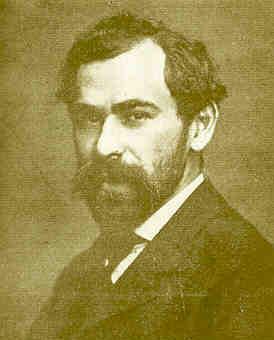
A ceremony to unveil a plaque commemorating Litvak and Šiauliai native Victor David Brenner will take place at 12:00 noon on Wednesday, December 14, at the Šiauliai Bank building at Tilžės street no. 149 in Šiauliai.
Victor David Brenner is best known as the designer of the Lincoln one-cent piece in the United States. which replaced the former one-cent piece featuring an Indian in 1909. He also designed the obverse of the new penny, replacing the former wreath and coat of arms with two sheaves of wheat surrounding the words “United States of America” and “ONE CENT.” The “wheat-back” reverse of the penny has since been replaced with one featuring the Lincoln memorial in the center with the same inscription around the edge in 1959. In 1982 the United States began to mint one-cent pieces with reduced copper content, replacing the earlier copper and tin denomination with a copper-plated zinc fac-simile.
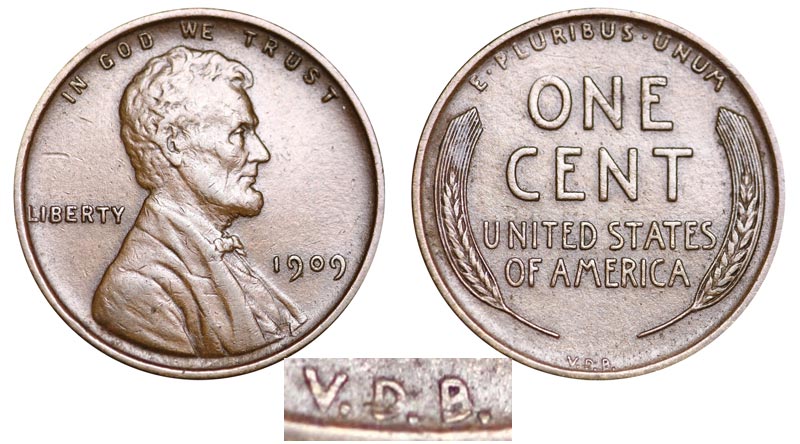

Chuck Hughes, the Canadian celebrity chief who has an entire collection of series on Canada’s Food Network cable channel and the owner of two renowned restaurants in Montréal, visited the Bagel Shop Café last week.
Best known for his show Chuck’s Day Off, now carried by the Cooking Network on cable networks in the United States as well, Hughes has a special place in his heart and his kitchen for seafood.
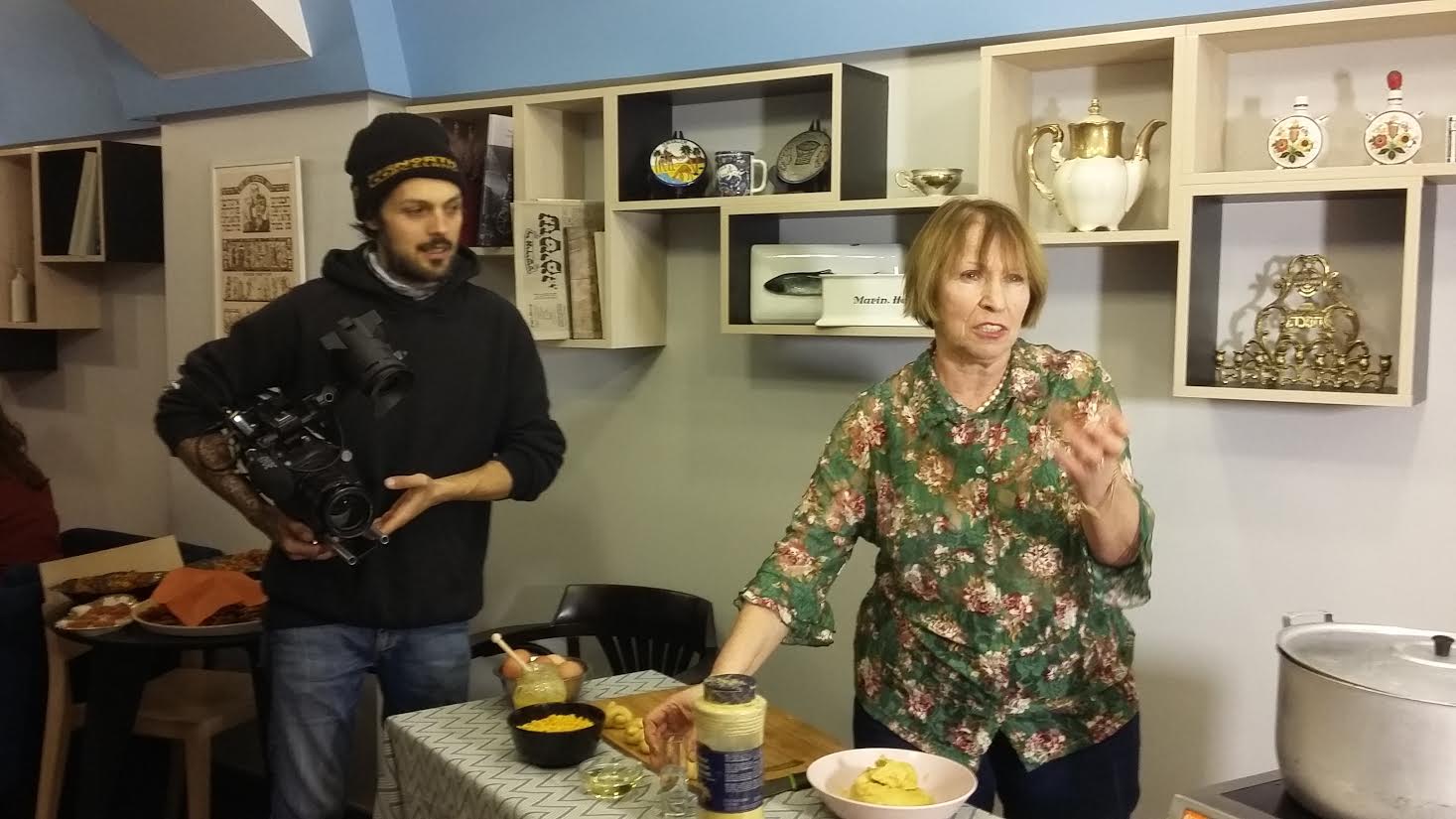
The LJC’s Ilona Rūkienė caught up with Chuck last week and asked him a few questions.
December 10–In the run-up to Hanukkah children’s activities were held at the LJC. Twenty-two people, parents and children in the LJC Social Department’s Jewish Family Services program, took part.
During the activities parents helped their children and everyone learned how to make candles, an essential tribute of the Festival of Lights. The children seemed to enjoy handling the pliable wax which will light up the holiday this year at their homes. They were also told the Hanukkah story. After the candle-making and story the children were treated to traditional Hanukkah doughnuts. It was an enjoyable event in the run-up to the Hanukkah holidays.
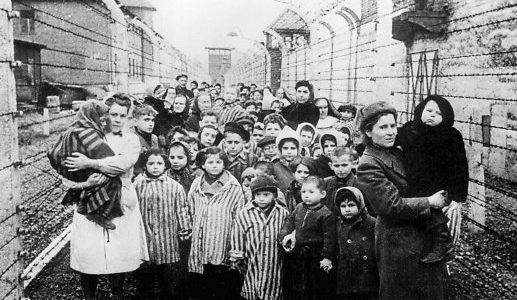
Finally a book has been published telling the story of how Moriz Scheyer successfully hid from the Nazis. The decades have not lessened the hatred he feels for those who aided the fuhrer.
Scheyer was the art director of one of the main newspapers in Vienna. He knew many of the city’s artists at the time and was an important figure in journalism covering literature in his own right. When the Nazis came to power, he had to quit his job and home. Hiding in France in 1943, he began writing what eventually became the book “Asylum: A Survivor’s Flight from Nazi-Occupied Vienna through Wartime France.”
The Holocaust was carried out without the civilized world having the courage to say it should stop, or even expressing its disgust. Only later, much later, when it was much too late, we began to receive nice expressions of solidarity in the context of general war propaganda. And at that time, when that was being done, the states which had all the power and could have done so without greater expenses, were unable to do their duty to open the door to the persecuted.
Full story in Lithuanian here.
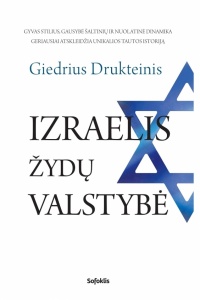
Accomplished author, lecturer and media personality Giedrius Drukteinis has a new book out called “Izraelis – žydų valstybė” [Israel: The Jewish State] and as with his comprehensive treatment of the United States-Viet Nam war, it’s a long one, 832 pages. It was published by Sofoklis publishing house in Vilnius in 2016.
Drukteinis goes through the main events in Jewish history in chronological order, from exile to Babylon, the Middle Ages, modern emancipation, roots of anti-Semitism, aliyah, Zionism, relations with Arabs, the Jewish experience during both world wars, the foundation of the state and modern development in the current period. The chronological layout is intended to help Lithuanian readers orient themselves to the creation and history of the Jewish state, according to the publisher.
The book devotes much space to the concept of aliyah leading up to the founding of the unique State of Israel. One reviewer said most of the book is about warfare.
lrytas.lt
Japan is a market of 125 million tourists. Kaunas is attractive as a destination for them because of the memory of Righteous Gentile Chiune Sugihara. Much has been done, but much more needs to be done, including presenting Kaunas as a kind of Casablanca of the North. Šiauliai University lecturer and historian Dr. Simonas Strelcovas recently returned from the land of the rising sun. There he researched Japanese attitudes towards Chiune Sugihara, the Japanese consul who issues thousands of visas to Jews in Kaunas in 1940, thus saving them. In Japan he is greatly honored. The historian says this respect should be exploited to attract tourists. Dr. Strelcovas is certain the nature of Lithuania then when the rescuer operated needs to be told. That Lithuania was not Nazi, and that, unlike other European states, accepted tens of thousands of refugees. He’s planning to reveal all this in an academic book in Japanese to be published next year.
Full story in Lithuanian here.

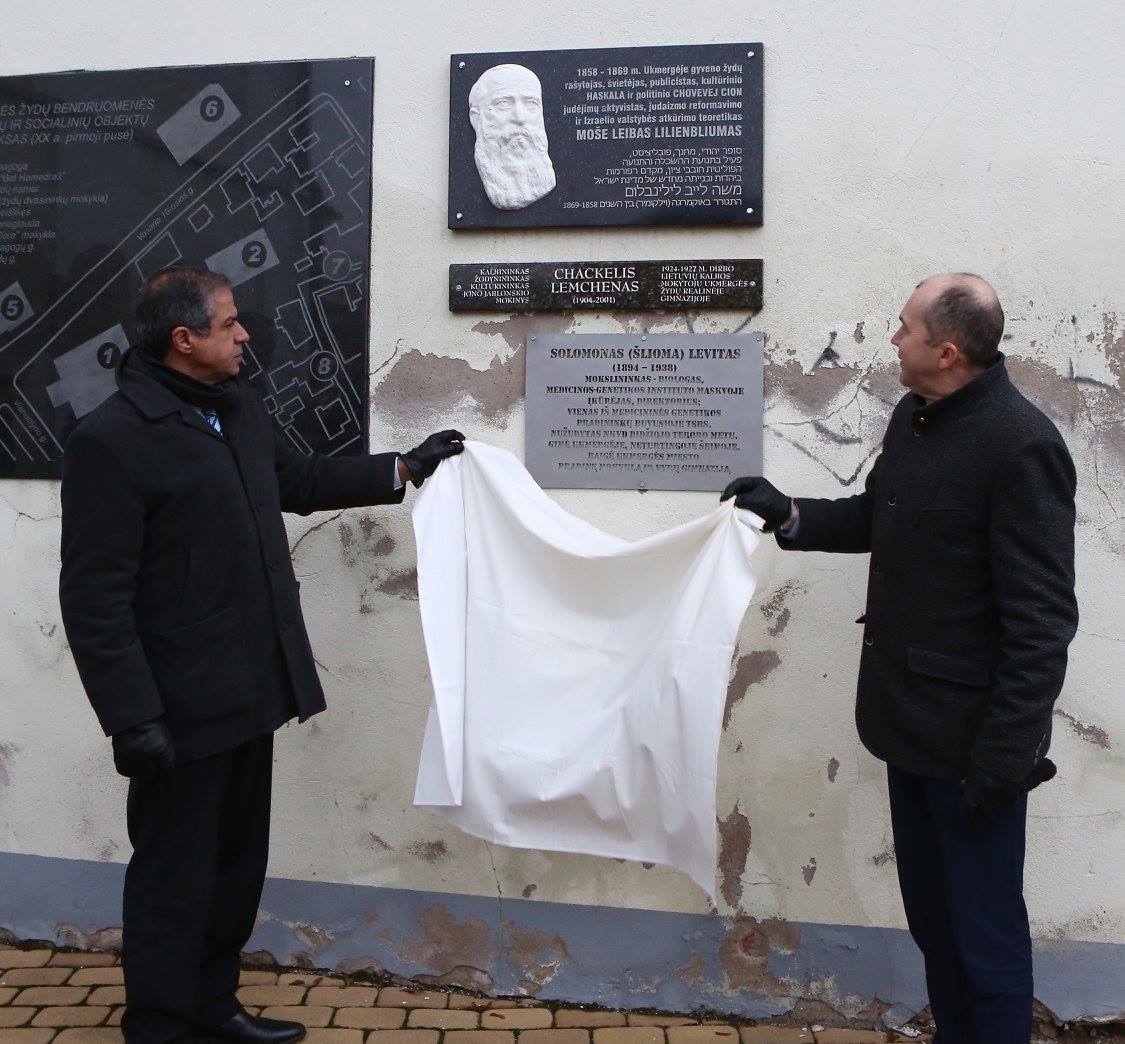
Two commemorative plaques honoring the famous Litvaks Solomon Levit (1894-1938) and Chackelis Lemchenas (1904-2001) have been unveiled in Ukmergė (Vilkomir), Lithuania. Levit and Lemchenas were from the area. Levit is noted for his work in biology and medicine, and as the founder of the Genetic Medicine Institute in Moscow. He attended school in the city of Ukmergė. Lemchenas was a talented and respected Lithuanian philologist, lexicographer, linguistic reformer and cultural figure in his own right, and taught at the Jewish Real-Gymnasium in Ukmergė.
The ceremony on December 6 was attended by Israeli ambassador to Lithuania Amir Maimon, Ukmergė Regional Jewish Community chairman Artūras Taicas, Ukmergė regional administrator Rolandas Janickas and vicar Šarūnas Petrauskas, among others.
Chairman Taicas said at the ceremony he was encouraged to see so many people turn out for the event. He invited the Israel ambassador and the regional administrator to unveil the commemorative plaques.
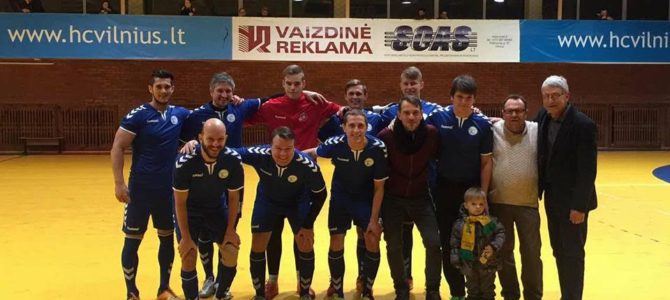
The mini soccer team of the Makabi Lithuanian Athletics Club is competing successfully in the Vilnius district tournament Select II in the Sunday League, which includes 10 teams. After foru matches Makabi are now in fourth place. The tournament continues and let’s hope after some injured players return our team makes it to the top. Good luck!
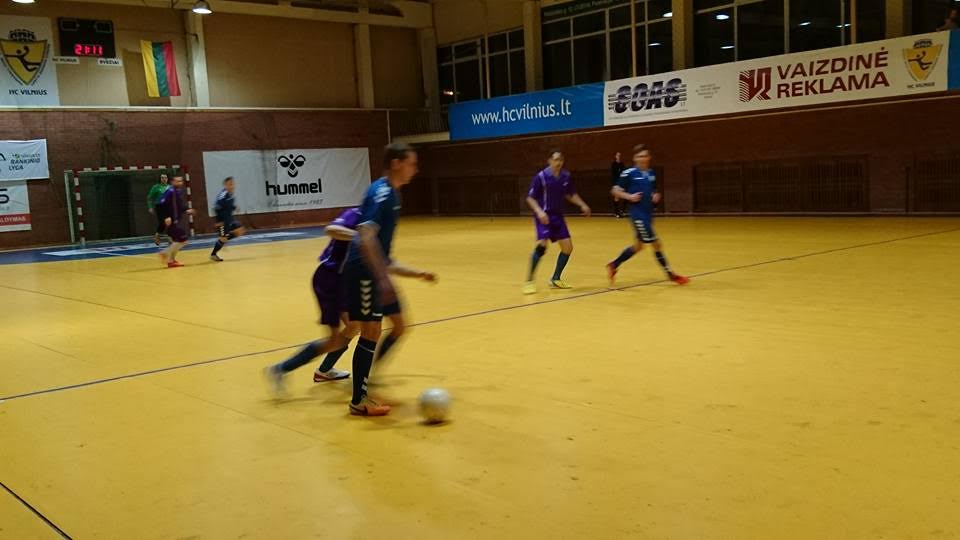
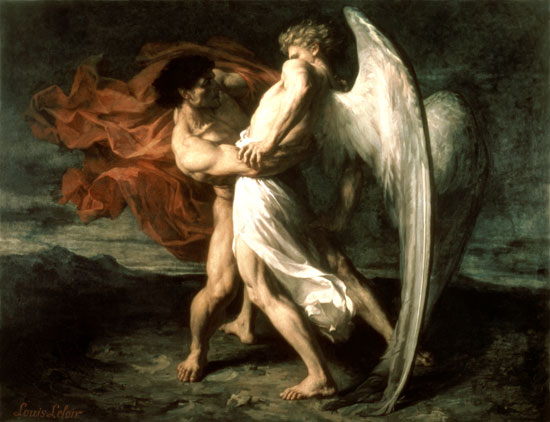
Dear Community members,
This is to inform you that the series of teachings about Jacob, the patriarch of Israel, is continuing. You are invited to Rabbi Kalev Krelin’s lesson called “The Metamorphosis of Jacob” where you will learn what changed after Jacob wrestled the angel, to be held at 6:30 P.M. on Thursday, December 15, 2016, at the Choral Synagogue in Vilnius located at Pylimo street no. 39.
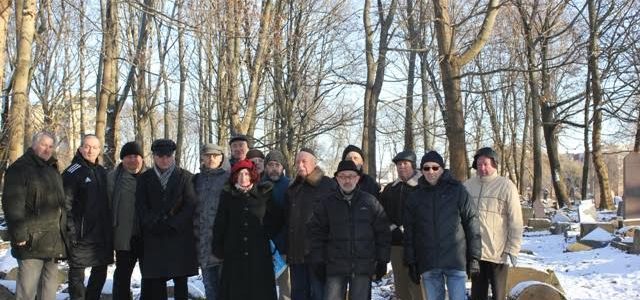
The Kaunas Jewish Community marked the 85th anniversary of the death of Daniel Dolski (stage name of Daniel or Donil Broides), one of the founders of the genre known as “estrada music” in Eastern Europe, popular and sometimes humorous schlager-style songs performed on stage. Iser Shreiberg, the chairman of the Kaunas Hassidic Synagogue Religious Community and a member of the Kaunas Jewish Community, said a prayer for the dead at Dolski’s grave in the Jewish cemetery in the Žaliakalnis neighborhood of Kaunas. Those who turned out for the commemoration recalled the Kaunas Jewish Community had tended the grave of the performer.